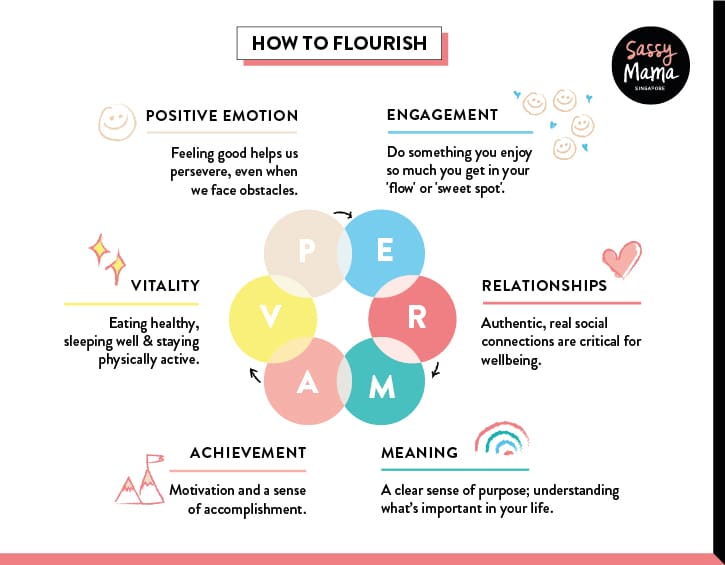







Are you flourishing? If not, do you know how to get there?
The word flourish probably brings to mind a healthy and blooming plant…but the term can be applied to people, too. Martin Seligman, the founding father of positive psychology, says the key to flourishing is high wellbeing.
Seligman has outlined the key ingredients of wellbeing in a model known as PERMA, often adapted to be PERMA(V). Although not the only wellbeing model, PERMA(V) covers the important and most commonly included elements of wellbeing. Plus, it is simple to understand and remember, which improves the chance that we will adopt it and increase our own flourishing!
As mamas it can be hard to find time for self-care, but it is so important for us to focus on our own wellbeing so that we can bring our best selves to our time with our children. Click through for six tips to help you flourish plus we’ve got a handy infographic on our last slide!
The first and perhaps most obvious element of wellbeing is positive emotion – aka happiness, joy, pleasure, optimism, satisfaction.
This is the “pleasant life” – and comes from doing things that we enjoy, such as making time for fun, seeing the positive in situations (e.g. glass half-full instead of half-empty), and being grateful for what we have. There’s lots of research that suggests that people have a general ‘set-point’ of happiness – and that even if something wonderful or terrible happens – that after a period of time we go back to a similar level of happiness as before the big event. However, with sustained effort, there is also evidence that we can improve our happiness set point. One quick and easy way to do this is via the “3 good things exercise”:
The “3 good things exercise” – every night, set aside 10 minutes before you go to sleep and write down 3 things that went well that day. The 3 things can be very small or more significant. Then, reflect on and write down why these 3 things went well. This simple exercise, when conducted for just one week, has been found to increase life satisfaction and decrease depression even 6 months later!
Engagement is about “flow” – when we focus on doing things that we enjoy and care about, we can truly engage and be in the present moment and enter a state of being known as ‘flow’. When we are in the flow, we are completely absorbed and so are less distracted by our thoughts and feelings. People experience flow when doing things that they love – it could be sport, music, a hobby, an activity at work, or playing with our children. Whatever it is, it is important to find what you love – what brings you to a state of flow – and to make time to practice it regularly. So, what is it that you love doing mama?
Tip: Seligman has found that identifying and developing our own signature strengths is a shortcut to achieving a state of flow and increasing wellbeing. You can identify your own signature strengths by taking the Values in Action Survey of Character Strengths (note: you will first need to register to create a free account). The questionnaire is long but it is quick to complete and the results are fascinating! There is also a strengths questionnaire designed specifically for children which could be great to get your kids to do mama – then you can help foster their own individual strengths!
When was the last time you laughed out loud? Or felt indescribable joy? And what makes up your happiest, most treasured memories? Chances are, these times all happened in the company of others. Seligman argues that “other people are the best antidote to the downs of life and the single most reliable up”.
Positive relationships – those that are authentic, energising, and supportive – are a critical ingredient in psychological wellbeing. Mama takeaway: invest time and energy in your key relationships – whether that be your mama tribe, significant other, or family. Don’t feel guilty about taking a break from the kids or dragging them along in order to stay connected with these important people.
Read more: How To Build A Mama Squad: Meeting Like-Minded Friends After Pregnancy
A life full of fun, pleasure, friendships and engaging hobbies sounds pretty nice, doesn’t it? But maybe it also sounds, well, kind of…meaningless. A little like filling up on popcorn but craving a substantial meal!
Meaning is the sense of being connected to something bigger – it provides our lives with a purpose, a feeling of belonging and greater fulfilment. Meaning can often lead to us sacrificing the other elements of wellbeing (the P, E, R, or A), but may still have a positive impact on our overall wellbeing by adding a greater sense of depth and purpose to our lives. Parenting is a classic example of this!
Try “The Eulogy Exercise”: this exercise is a very helpful way to identify your key meaning and purpose by bringing to mind what is most important in your life. It need only be carried out once and takes 20-30 minutes:
- Reflect on and write down the key themes and messages that you’d like to be present in your own eulogy – this can be quite rough and include bullet points, or just key words. What would you like your love ones to say about you? What would what you like to be remembered for? What’s your legacy?
- Review what you have written down – what are the key themes? What are the main roles you would like to have?
- Evaluate whether the life you are currently living is aligned to the person and life you’d like to be remembered for. Continue to use the output of this exercise to make decisions and take actions which help build the life that you’d like to leave behind.
Having a sense of achievement, mastering new skills, and making progress towards our goals is an important part of what gets us up in the morning and makes us feel good about ourselves.
Accomplishments are a very individual thing and vary based on our own skill level, priorities and values, and time of life. For example, one person may feel a sense of accomplishment from getting a load of washing done and cooking dinner, another from completing a large project at work, and another from reaching their goal of running a certain distance. Whatever the goal or task – it doesn’t matter. What does matter is ensuring that you have something in your life that you feel good about doing – that provides you with a sense of accomplishment.
As Mums this can be hard, right? I think it’s something I’ve struggled with moving from a big corporate job to spending my days caring for babes and playing with toddlers! What I’ve learnt from this is that it is so important to find the things that give you that personal sense of achievement, and to prioritise some time toward these things.
Although not part of Seligman’s original PERMA model, psychological wellbeing is difficult to achieve if we’re not taking good care of our own physical wellbeing. Improving our vitality is about looking after our bodies – eating healthy foods, exercising, and ensuring we get enough sleep. All things that are difficulty to consistently obtain as a mum, but which are worth prioritising when possible.
So now you know a little more about it, do you think you’re flourishing? What aspect of PERMA(V) are you lacking? If you’d like a more objective measure of this, you could take the PERMA questionnaire. The results will provide you with a score for each of the elements in PERMA. But keep in mind that the different elements will have varying degrees of importance for everyone, so it really is about sitting down and reflecting on the aspects of wellbeing that are most important for you.
Images from Pexels






 View All
View All





 View All
View All








 View All
View All





